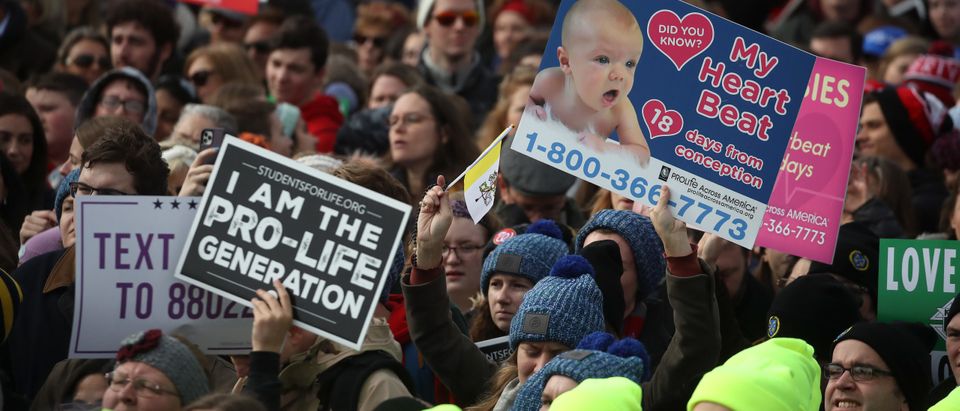Editor’s note: We endeavor to bring you the top voices on current events representing a range of perspectives. Below is a column arguing that abortion will be a decisive issue in the 2022 midterms. You can find a counterpoint here, where Carrie Sheffield argues that abortion will not be a decisive issue in the midterms.
Among voters who say the the issue of abortion influences the way they vote, polling consistently finds more voters select the pro-life candidate than the pro-abortion one. Put another way, there is a net advantage for pro-life candidates among those who take abortion into account when voting.
After the 2020 elections, a McLaughlin & Associates poll commissioned by National Right to Life found that 41% of voters nationally said abortion affected their vote. Among those voters, 56% voted for the pro-life candidate. Conversely, 44% voted for the pro-choice candidate. This shows that pro-life candidates benefited from about a five percent advantage among the entire electorate. Past elections show similar advantages.
The leaked draft opinion by Justice Alito in the Dobbs v. Jackson case has not changed the fundamentals of abortion politics.
Polling on Roe v. Wade can be complicated. Most Americans do not know that Roe and its companion case, Doe v. Bolton, usurped the power of the people through their duly elected representatives to enact laws on abortion and imposed abortion for any reason throughout pregnancy. Americans also generally oppose the overturning of any previous Supreme Court ruling regardless of the issue.
CNN’s generic ballot poll, which asks voters which party’s candidates they intend to vote for in November (taken before the leaked Supreme Court draft opinion), found Republicans with just a one point advantage over Democrats. But following the leak, the advantage Republicans had jumped to seven points.
In 2021, following the media meltdown over the Texas law that protects unborn children when their heartbeat can be detected, Virginia gubernatorial candidate Terry McAuliffe thought he could weaponize the issue against his Republican opponent. Making it one of his central issues, McAuliffe ran countless ads hitting now-Governor Glenn Youngkin on abortion. He even visited an abortion facility for a campaign stop. McAuliffe ultimately lost that election by several points, in a state Biden carried just a year earlier by ten.
A January 2022 Marist poll found that 71% of Americans support limits on abortion, including a majority of Independents and a sizable number of Democrats. The same poll also found 54% of respondents oppose taxpayer funding of abortion.
Pro-abortion candidates like Terry McAuliffe, who are beholden to the well-funded and uncompromising abortion lobby, have lost elections when they put their abortion-without-limits position at the forefront of their campaigns. Heading into the midterms, Democrats are doubling down on their out-of-touch platform of taxpayer-funded abortion on demand.
Democrats plan to run on their support for the so-called Women’s Health Protection Act (WHPA), a radical bill which really should be called “Abortion Without Limits Until Birth Act” because it would enshrine abortion in federal law and would tear down pro-life protections on the state level. The bill would invalidate and prevent future passage of popular pro-life proposals like parental involvement, informed consent and conscience protections.
On Wednesday, the WHPA failed to pass yet again in the Senate, with Senator Joe Manchin (D-WV) being the lone Democrat in opposition. Vulnerable incumbent Senators Mark Kelly (D-AZ), Catherine Cortez Masto (D-NV), Raphael Warnock (D-GA), and Maggie Hassan (D-NH) voted for the bill. Prominent Democrat candidates for Senate in key swing states have also signaled their support, including Tim Ryan in Ohio, John Fetterman and Conor Lamb in Pennsylvania, Val Demings in Florida, Sarah Godlewski and Mandela Barnes in Wisconsin, and Cheri Beasley in North Carolina.
Pro-life Republicans are in a strong position to make significant gains in November. To do so, they must refuse to cede ground to the other side by hiding from the life issue. They can confidently contrast their support for commonsense protections for unborn children and their mothers with the radical stance of the Democrats. They can remind voters of the humanity of the unborn child including the biological facts that unborn babies have beating hearts, detectable brain waves, and the capacity to feel pain. They can emphasize that being pro-life means safeguarding the lives unborn children but also standing up for women by building a society where no woman feels her only choice is to end the life of her unborn child.
Supporting the right to life for unborn children and their mothers is a winning issue but, more importantly, a human rights issue.
Carol Tobias is the president of the National Right to Life.


